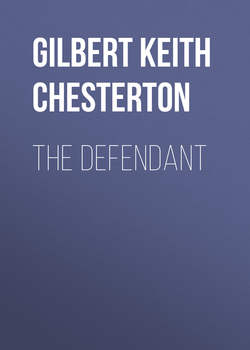Читать книгу The Defendant - Гилберт Честертон, Gilbert Keith Chesterton, Лорд Дансени - Страница 5
A DEFENCE OF SKELETONS
ОглавлениеSome little time ago I stood among immemorial English trees that seemed to take hold upon the stars like a brood of Ygdrasils. As I walked among these living pillars I became gradually aware that the rustics who lived and died in their shadow adopted a very curious conversational tone. They seemed to be constantly apologizing for the trees, as if they were a very poor show. After elaborate investigation, I discovered that their gloomy and penitent tone was traceable to the fact that it was winter and all the trees were bare. I assured them that I did not resent the fact that it was winter, that I knew the thing had happened before, and that no forethought on their part could have averted this blow of destiny. But I could not in any way reconcile them to the fact that it was winter. There was evidently a general feeling that I had caught the trees in a kind of disgraceful deshabille, and that they ought not to be seen until, like the first human sinners, they had covered themselves with leaves. So it is quite clear that, while very few people appear to know anything of how trees look in winter, the actual foresters know less than anyone. So far from the line of the tree when it is bare appearing harsh and severe, it is luxuriantly indefinable to an unusual degree; the fringe of the forest melts away like a vignette. The tops of two or three high trees when they are leafless are so soft that they seem like the gigantic brooms of that fabulous lady who was sweeping the cobwebs off the sky. The outline of a leafy forest is in comparison hard, gross and blotchy; the clouds of night do not more certainly obscure the moon than those green and monstrous clouds obscure the tree; the actual sight of the little wood, with its gray and silver sea of life, is entirely a winter vision. So dim and delicate is the heart of the winter woods, a kind of glittering gloaming, that a figure stepping towards us in the chequered twilight seems as if he were breaking through unfathomable depths of spiders' webs.
But surely the idea that its leaves are the chief grace of a tree is a vulgar one, on a par with the idea that his hair is the chief grace of a pianist. When winter, that healthy ascetic, carries his gigantic razor over hill and valley, and shaves all the trees like monks, we feel surely that they are all the more like trees if they are shorn, just as so many painters and musicians would be all the more like men if they were less like mops. But it does appear to be a deep and essential difficulty that men have an abiding terror of their own structure, or of the structure of things they love. This is felt dimly in the skeleton of the tree: it is felt profoundly in the skeleton of the man.
The importance of the human skeleton is very great, and the horror with which it is commonly regarded is somewhat mysterious. Without claiming for the human skeleton a wholly conventional beauty, we may assert that he is certainly not uglier than a bull-dog, whose popularity never wanes, and that he has a vastly more cheerful and ingratiating expression. But just as man is mysteriously ashamed of the skeletons of the trees in winter, so he is mysteriously ashamed of the skeleton of himself in death. It is a singular thing altogether, this horror of the architecture of things. One would think it would be most unwise in a man to be afraid of a skeleton, since Nature has set curious and quite insuperable obstacles to his running away from it.
